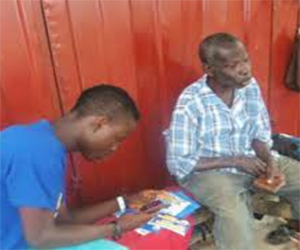On the morning of October 2nd, families in Koforidua, Ghana awoke to cries of “Donkomi! Donkomi!” Rushing to the market to find out what was on sale (“Donkomi” means “limited time discount” in Twi), men and women were greeted by a team busily issuing e-coupons for long lasting insecticidal nets (LLINs).
A culture of net use has been established in Ghana and across Africa thanks to widespread distribution of free nets; however, rising costs, sinking budgets and challenging mass distribution logistics have made free net distribution unsustainable.
The NetWorks project, a five-year, USAID-funded global project led by the Johns Hopkins Bloomberg School of Public Health Center for Communication Programs (CCP) is testing an electronic coupon (e-coupon) scheme as a new method for distributing LLINs.
The objectives of the pilot include creating an e-coupon platform capable of offering different subsidy levels to targeted populations and engaging multiple donors who have control over the amount of money and length of time they contribute, demonstrating a cost-effective public-private partnership and creating demand for subsidized LLINs in Koforidua and selected workplaces.
In partnership with Malaria Consortium and the Mennonite Economic Development Associates, NetWorks launched the e-coupon pilot program on October 2nd in Koforidua, a town with a population of about 200,000 in the Eastern Region of Ghana. The pilot runs until the end of January and includes radio spots, announcements and print materials all explaining how to use the e-coupons to acquire discounted nets.
This e-coupon pilot seeks to reach three target audiences with varied LLIN subsidy levels: members of the general public, school children and workplace employees. E-coupons are being issued at participating clinics and retailers, in classes and in the workplace, and they can also be self-issued by sending a short-code SMS to a specified number. The coupons can be redeemed at participating retailers for a discounted LLIN. Lessons learned through this pilot will be used to inform the design of the scale-up of the e-coupon scheme in Ghana, planned for 2014.
Learn more about NetWorks.




